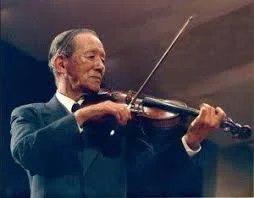Suzuki-INspired Teaching
Who was Shinichi Suzuki?
Shinichi Suzuki was a violinist, educator, philosopher, and humanitarian. Born in 1898, he studied violin in Japan for some years before going to Germany in the 1920s for further study. After the end of World War II, Dr. Suzuki devoted his life to the development of the method he called Talent Education.
Suzuki based his approach on the belief that “musical ability is not an inborn talent but an ability which can be developed. Any child who is properly trained can develop musical ability, just as all children develop the ability to speak their mother tongue. The potential of every child is unlimited.”
Dr. Suzuki’s goal was not simply to develop professional musicians, but to nurture loving human beings and help develop each child’s character through the study of music.
Dr. Suzuki was awarded numerous honorary doctorates during his lifetime and was nominated for the Nobel Peace Prize in 1993.
Dr. Shinichi Suzuki Quotes
How is the Suzuki Method different from other traditional methods? (by Avi Friedlander)
“Man is a son of his environment.”
“Without hurry, without rest.”
“The baby is born. Does he start to say ‘Mama’ the next day? For months, he just listens.”
“Listening until we remember is not enough. We must listen until we cannot forget.”
“Success breeds success.”
“Ability equals knowledge plus 10,000 times.”
“If love is deep, much can be accomplished.”
“Tone has living soul without form.”
“I respect children as my teachers…I radiate respect for them.”
“Practice without progress results from practice without thought.”
Every child can learn
Positive approach
Early start: modeling a language (Mother-Tongue method)
Environment: parental environment and listening (putting the sound in their head constantly)
Reading when appropriate (we learn to speak before we learn to read)
Common repertoire: makes group classes possible (group classes motivate)
Common studied recordings (syncing how the pieces sound)
We are learning about humanity and beauty through music (character development)
Workshops and Institutes
Use of review pieces
Tonalizations
One point segments (specific practice assignments)
Core Elements of My Teaching
Everyone Can Learn
Shinichi Suzuki realized the implications of the fact that children the world over learn to speak their native language with ease. He began to apply the basic principles of language acquisition to the learning of music and called his method the mother-tongue approach. The ideas of parent responsibility, loving encouragement, constant repetition, etc., are some of the special features of the Suzuki approach. A more detailed look at this philosophy is explained in a seminar titled, Every Child Can, which is offered by many Suzuki Teacher Trainers and is a required prerequisite training for certified Suzuki instructors.
Parental/Guardianship Involvement
As when a child learns to talk, parents and guardians are involved in the musical learning of their child. They attend lessons with the child and serve as “home teachers” during the week. One parent often learns to play before the child, so that they understand what the child is expected to do. Parents work with the teacher to create an enjoyable learning environment for the student and community.
Early Beginning
While it is never too late to begin, the early years are crucial for developing mental processes and muscle coordination. Listening to music should begin as soon as possible (at any age) and formal training may begin as early as age three or four.
Daily Listening
People learn words after hearing them spoken hundreds of times by others. Listening to music every day is important, especially listening to pieces in their repertoire so the child knows them immediately.
Repetition & Review
Constant repetition is essential in learning to play an instrument. People do not learn a word or piece of music and then discard it. They add it to their vocabulary or repertoire, gradually using it in new and more sophisticated ways.
Encouragement
As with language, a person’s effort to learn an instrument should be met with sincere praise and encouragement. Everyone learns at their own rate, building on small steps so that each one can be mastered. Students are also encouraged to support each other’s efforts, fostering an attitude of generosity and cooperation.
Learning with Others
In addition to private lessons, students participate in regular Cello Group Classes and performances at which they learn from and are motivated by each other.
Graded Repertoire
People use language for its natural purpose of communication and self-expression. Pieces in the repertoire are designed to present technical problems to be learned in the context of the music rather than through dry technical exercises. Earlier repertoire may be used to help learn later repertoire.
Delayed Reading
People learn to read after their ability to talk has been well established. In the same way, students should develop basic technical competence on their instruments before being taught to read music.



